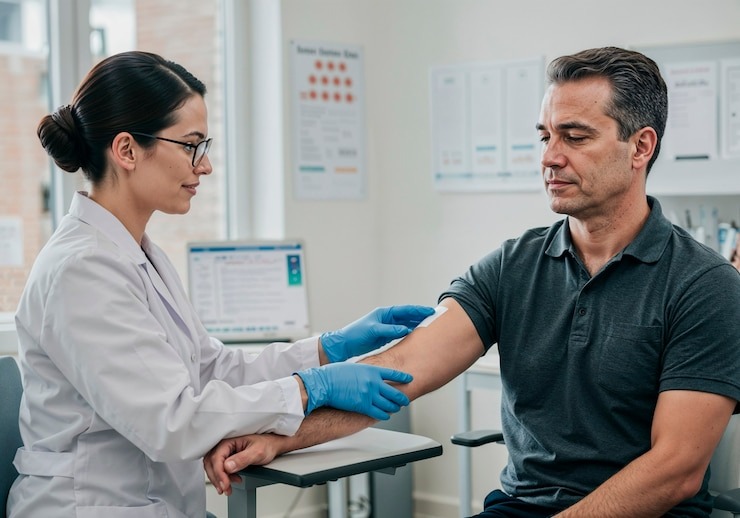
If you’re someone who gets excited about the world of healthcare but doesn’t want to spend years in medical school, becoming a phlebotomist might be the perfect choice. It’s a career that allows you to help people, be part of a medical team, and start working faster than you think.
But before we dive in, let’s answer a big question: what is a phlebotomist?
A phlebotomist is the person who draws blood from patients. Whether it’s for medical tests, donations, or transfusions, this job is crucial. Blood tests help doctors find out what’s going on in our bodies. Without trained phlebotomists, this process wouldn’t run smoothly.
Let’s explore how you can start your journey with phlebotomist training, what you’ll learn, and why this career path might be just what you need.
What is Phlebotomy and Why is it Important?
Phlebotomy is the medical term for drawing blood. The word comes from Greek: “phleb” means vein and “tomy” means to cut. But don’t worry — modern phlebotomy doesn’t involve cutting. It’s all about using sterile needles to safely collect blood.
Every day, hospitals and labs rely on skilled phlebotomists. They make patients feel comfortable and ensure that samples are taken correctly. This work helps diagnose everything from infections to chronic illnesses like diabetes.
Understanding the Antebrachial Fossa – Where the Magic Happens
When drawing blood, phlebotomists usually look for veins in a special area of the arm called the Antebrachial fossa. This is the inside bend of your elbow — that soft spot where your arm folds.
This area is one of the best places to find large, visible veins. It’s the main zone for blood draws because the veins here are close to the surface and easy to access. Knowing how to work with the Antebrachial fossa is one of the first things you’ll learn during your training.
You’ll learn how to locate veins, clean the area, insert the needle the right way, and comfort nervous patients. All these steps are important to make sure everything goes smoothly.
Phlebotomy Training: What Will You Learn?
Starting phlebotomist training means you’ll gain both classroom knowledge and real-world practice. Here’s what you can expect to learn:
1. Human Anatomy
Understanding where the veins are located — especially in the arms — is key. You’ll learn about different vein locations and how blood flows in the body.
2. Safety and Hygiene
You’ll be taught how to keep everything clean and sterile. This includes learning how to use gloves, clean needles, and safely throw away used items.
3. Equipment Use
Phlebotomists don’t just use needles. You’ll learn about tourniquets (to make veins pop), vials, labels, and special tubes for different tests.
4. Communication Skills
People are often scared of needles. You’ll be trained to talk calmly with patients and make them feel at ease, especially kids or people who are nervous.
5. Hands-On Practice
Good phlebotomy programs give you the chance to practice your skills in a safe setting before working with real patients.
Why Choose Phlebotomy Training with Job Placement?
Here’s one of the best parts — you don’t have to worry about what comes after training. Some schools offer phlebotomy training with job placement, which means they help you find a job once you finish your course.
This is a big deal. It saves you time and stress from hunting for jobs. These programs often work closely with hospitals, labs, or clinics and can connect you to interviews right after graduation.
When looking at training programs, always check if they include job placement support. That way, you can move directly into a real job once your training is complete.
Where Can You Work as a Phlebotomist?
After your training, there are many places where you can work:
- Hospitals
- Doctor’s offices
- Blood donation centers
- Laboratories
- Urgent care clinics
Some phlebotomists even work in mobile blood drives, traveling to schools, businesses, or community events.
How Long Does Training Take?
Unlike many medical careers that take years of school, phlebotomy training usually takes just a few weeks to a few months. Some programs offer full-time courses that last 4-8 weeks. Others may offer part-time or weekend classes if you’re working or going to school.
It’s a fast way to step into the healthcare world.
A Trusted Name in Training: Centauri World
If you’re serious about starting a career as a phlebotomist, it’s important to choose a trusted training provider. Centauri World offers programs that combine classroom learning, hands-on practice, and certification support. Their program is known for offering phlebotomy training with job placement, helping students feel confident and ready from day one.
With strong connections to healthcare providers and labs, Centauri World gives you the support you need to land a job quickly after you finish your course.
What Does a Phlebotomist Make?
Money matters — especially when choosing a career. While pay may vary depending on where you live, phlebotomists often earn between $35,000 to $50,000 per year. Some experienced or specialized phlebotomists earn even more.
Plus, this is a great stepping stone if you decide to grow your career in healthcare later. You could go on to become a nurse, lab tech, or even a medical assistant.
Is Phlebotomy Right for You?
You don’t need to be a science genius or a straight-A student to become a phlebotomist. What matters most is that you:
- Like helping people
- Are good with your hands
- Stay calm under pressure
- Can follow rules and safety steps
- Are comfortable working with needles and blood
If that sounds like you, this might be the career path you’ve been looking for.
Take the First Step Toward a Bright Future
Choosing to start your phlebotomist training is more than just learning how to draw blood. It’s about becoming a part of something bigger — the healthcare system that helps millions of people every day.
With programs that offer phlebotomy training with job placement, and expert instruction on areas like the Antebrachial fossa, you’ll be ready for success.
And if you’re looking for a place to begin, consider Centauri World — where training meets opportunity.
Final Thoughts
A career in phlebotomy offers more than just a paycheck — it gives you purpose, stability, and the chance to grow. It’s simple to get started, and with the right support, you could be working in healthcare sooner than you ever imagined.
So why wait? Your future in healthcare could be just a few weeks away.




